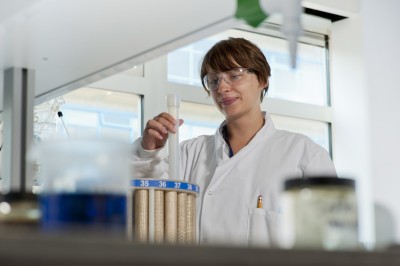

Chemistry Foundation Year
This one-year, full-time foundation year programme will provide you with knowledge of chemistry concepts, theories, ideas and tools to make it easier to get started at university. It is an extra year of study at the start of your course that leads on to one of our full degree programmes.
What you will study

You will develop a fundamental understanding of chemistry concepts, whilst starting to specialise in topic areas towards the end of the semester. All the concepts are discussed through a university chemistry degree level lens, removing some of the misconceptions from A-level (and equivalent) chemistry courses. Sustainability is also taught throughout the course, with certain topics being further touched upon towards the end.
Your learning will also be supplemented with additional mathematics, physics, and biology content that will help support the additional years of your chemistry degree.
To see what modules you’ll be studying on your foundation Year, see the foundation tab in the ‘Course structure’ section on your chosen degree page.
Our Chemistry Foundation Year programme is an excellent starting point for a chemistry degree. As a lecturer on the programme, I particularly enjoy the amount of small-group and one-to-one interaction I get with students, which not only lets me personalise feedback but also develop a rapport with the group. I also lead on later modules that follow on directly from this course, which means I’m able to guide our foundation year students to exactly where they need to be in terms of their chemistry knowledge and skills.James Wright, Lecturer in Physical, Analytical and Inorganic Chemistry

Teaching and learning
You will be taught by a team of specialist foundation year lecturers. The team are experienced subject specialists who will equip you with a range of skills:
- Dr Nathaniel Bingham (chemistry)
- Dr James Wright (chemistry)
- Dr Anas Alkyal (chemistry)
- Patricia Warner (maths)
- Lewis Baker (physics)
- Andrea Markou (biology)
You will also be assigned a chemistry academic as a personal tutor throughout your studies.
Day-to-day learning
You will benefit from lectures, tutorials, workshops, computer labs, and chemistry laboratory sessions throughout your foundation year. Our foundation academics apply effective and innovative teaching methods through interactive learning and direct observation. The smaller group chemistry sessions allow you to explore topics and use specialist equipment to enrich your understanding.
Throughout semester 1 and semester 2, you will also get the opportunity to take part in research projects, both individually and as a group, which will develop your research, presentation, teamwork, and self-reflection skills.
Practical sessions
The foundation year practicals will give you an excellent opportunity to get familiar with the equipment and layout in smaller groups.
Mixture of large and small class lectures
You will benefit from several different teaching styles and class sizes.
Integrated learning
Our foundation programme is fully integrated into the chemistry strand of the School of Chemistry and Chemical Engineering, meaning you are being taught by academics who teach and design courses later in your undergraduate degree.
Friendly and open communication
We are proud to get to know each of our students well in chemistry. We have open-door policy, meaning you can feel comfortable approaching lecturers whenever you need support.
Skills and employability focus
There is also a heavy emphasis on integrated skills within the foundation year, which will not only help you throughout your degree, but also post-degree.
Assessment
Assessments vary in the foundation year depending on the module, but include a mixture of exams, coursework (self-reflection, lab reports, research papers), and presentations. We provide this range to help prepare you for future assessments throughout your degree, whilst also building on skills required for post-degree employment.
Explore our courses
Visit our course pages for more information on the Chemistry Foundation Year, including:
- Module details
- Entry requirements
- Fees and funding
- How to apply.


